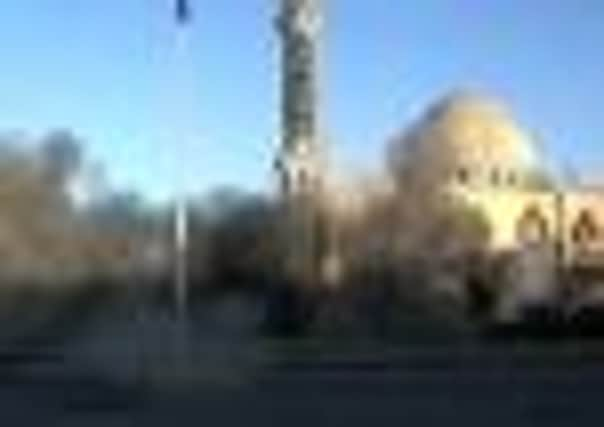Syria: Government bombardment of Homs intensifies


Government forces are trying to crush pockets of violent resistance in the western city, the epicentre of an 11-month-old uprising that has brought Syria ever closer to civil war.
The intense shelling in neighbourhoods such as Baba Amr has made it difficult to get medicine and care to the wounded, and some areas have been without electricity for days, activists claim.
Advertisement
Hide AdAdvertisement
Hide Ad“Snipers are on all the roofs in Baba Amr, shooting at people,” Abu Muhammad Ibrahim, an activist in Homs, said by phone.


“Anything that moves, even a bird, is targeted. Life is completely cut off. It’s a city of ghosts,” he added. As he spoke, explosions could be heard in the background. “The bombardment has not eased, day or night,” he said, asking to be identified by his nickname for fear of reprisals. “Do you hear the sound of the rockets? Children have been wounded, elderly with extreme injuries.”
Hundreds of people are believed to have been killed since early Saturday in the heaviest attack the city has endured since the uprising began in March, activists said.
A Syrian doctor, struggling to treat the wounded at a field clinic in a mosque, delivered an emotional plea via YouTube video. Standing next to a bloodied body on a table, the man, named only as Mohammed, said to the camera, and to the outside world: “We appeal to the international community to help us transport the wounded. We wait for them here to die in mosques.
“I appeal to the United Nations and to international humanitarian organisations to stop the rockets from being fired on us.”
“This brutal assault on residential neighbourhoods shows the Syrian authorities’ contempt for the lives of their citizens in Homs,” said Anna Neistat, associate emergencies director at Human Rights Watch. “Those responsible for such horrific attacks will have to answer for them.”
The US-based group also said eyewitness accounts, as well as video reviewed by its arms experts, suggest Syrian government forces are using long-range, indirect fire weapons such as mortars. Some claims were made yesterday that the regime is also utilising air power.
The wounded have overwhelmed makeshift hospitals and clinics, and there were growing concerns that the locked-down city could soon run out of supplies.
Advertisement
Hide AdAdvertisement
Hide Ad“There is medicine in the pharmacies, but getting it to the field clinics is very difficult. They can’t get the medicine to the wounded,” Mohammed Saleh, a Syria-based activist, said by telephone.
Baba Amr, he said, has been without electricity since Saturday.
Mr Saleh said most of the government attacks have been “bombardment from a distance,” with regime forces keeping armoured vehicles out of the neighbourhoods.
Fighters from the rebel Free Syrian Army have been firing back with rocket-propelled grenades and rockets, according to activists.
The Britain-based Syrian Observatory for Human Rights and the Local Co-ordination Committees were trying to compile numbers and names of those killed yesterday. The LCC, an activist group, said up to 100 people were killed in Homs, but the toll was impossible to independently verify. The Observatory reported 46 deaths in Homs.
Activists also reported violence in Zabadani and Daraa.
The number of children killed has climbed into the hundreds, said Radhika Coomaraswamy, the UN representative for children in armed conflict, adding that the situation was particularly harrowing in Homs.
The Syrian regime’s crackdown on dissent has left it almost completely isolated internationally as nations have imposed sanctions and withdrawn diplomats. In the latest action, Libya yesterday gave Syria’s top envoy and embassy staff 72 hours to leave Tripoli, according to Libyan foreign ministry press officer Saad Elshlmani.
Also yesterday, Germany expelled four Syrian diplomats following the arrest this week of two men accused of spying on Syrian opposition groups.
Advertisement
Hide AdAdvertisement
Hide AdForeign minister Guido Westerwelle said he had ordered the expulsions of the four Syrian embassy employees.
German federal prosecutors said they had arrested a Syrian and a German-Lebanese dual national on suspicion that they had been spying on Syrian opposition supporters in Germany for several years.